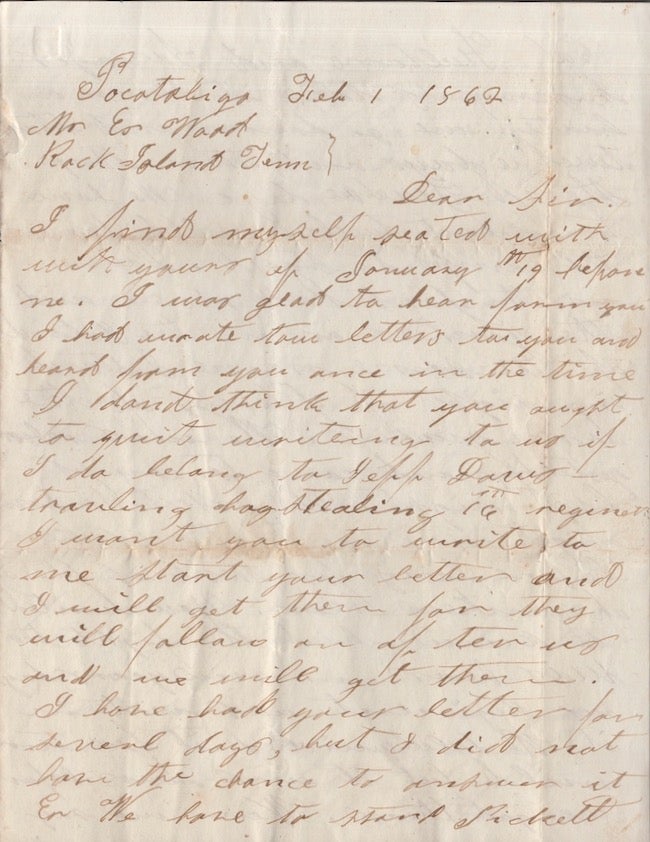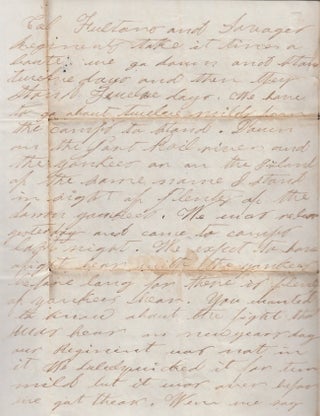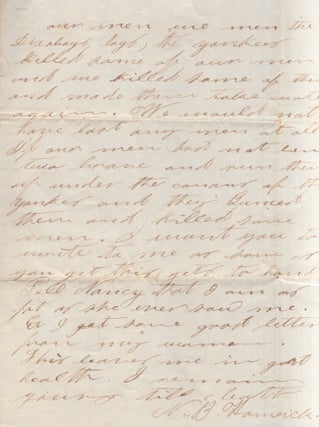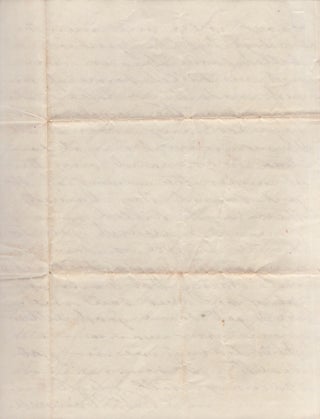Confederate soldier's February 1, 1862 reply to Mr. E Ward, Rock Island, Tennessee while camped at Pocotaligo, near Yemassee South Carolina.
Pocotaligo: n.p., 1862.
Letter. Letter. Approx. 8" x 5". 3 pages of manuscript. No envelope or stampless mark on the paper. Paper has three folds. Paper is in very good condition with light edge wear to a couple of spots. The following transcription is a best guess. The legibility of letter is difficult to transcribe and some words are omitted and other words spelled as they appear.
Pocotaligo Feb 1 1862
Mr E Ward Rock Island Tenn
Dear Sir,
I find myself seated with yours of January 19th before me. I was very glad to hear from you I had wrote four? letters to you and heard from you once in the time I dont think that you ought to quit? writeing to us if I do belong to Jeff Davis traveling hog? hay? stealing 16th regiment I want you to write to me start your letter and I will get them for they will fallaw? ? ? ten us and we will get them. I have had your letter for several days, but I did not have the chance to answer it E We have to stand Pickett Cal Ful? and Savages Regiments take it times a ? we go have ? and stand twelve days and then they stand twelve days. We have to go about twelve milds (miles) from the camps to stand. Darien is? the Part Rail river and the yankees an on the Island of the same name I stand in sight of plenty of the damn yankees. We was ? yesterday and came to camps last night. We expect to have a fight hear with the yankees before long for there is plenty of yankees hear. You wanted to know about the fight that was hear on New Years day our regiment was not in it. We ? it for ten mild (mile) but it was over before we got thear. Wen we say our men we men (mean) the Dixaboys ?, the yankees killed our men and we killed some of there and made them take ? again. We would nat have lost any men at all if our men had nat were two brave and run there up under the canans at the yankees and they Burned them and killed some men. I want you to write to me as soon as you get this (gets to hand) Tell Nancy that I am as fit as she ever saw me. E I get same good letter from my mama. This leaves me in good health. I remain yours till ? N.B. Hamrick. Good. Item #22662
The Battle Mr. Hamerick? referenced in this letter January 1st, 1862 was probably part of the Union Army's Port Royal campaign. A battle took place along the Coosaw River near the Port Royal Ferry in Beaufort County, South Carolina. From the Beaufort County Library:
In late December 1861 the Union forces recognized that the Confederates recently removed to the mainland had been building batteries along the Coosaw River near the Port Royal Ferry. Union Commanding General I.I. Stevens ordered components of the 8th Michigan Infantry, 47th and 48th New York Infantries, 1st New York Engineers, and the 50th Pennsylvania to destroy the Confederate breastworks, capture the guns, and force the retreat of some companies of the 12th South Carolina Infantry into the interior of Beaufort District. The Union forces accomplished their mission on New Year’s Day, January 1, 1862 with minimal casualties.
The first Battle of Pocotaligo took place May 28th, 1862. The Union army goal was to tear up the railroad between Charleston and Savannah. The second Battle of Pocotaligo took place October 22, 1862. In the first battle the Union moved to destroy a bridge and having reached their objective retreated back to Hilton Head. both armies suffered a few casualties. In the second Battle the Union's goal was again to tear up the Railroad between Savannah and Charleston. After pushing the Confederates back to Pocotaligo the Union initiative stalled and the Union army retreated before nightfall.
An interesting side note on the future fate of N. B. Hamerick(sp?) during the War comes from articles collected in The Spencer Times and the Sparta Exhibitor titled "Recollections of the War From Carroll H. Clark" (Transcribed with all the commas, dashes and lack of capitalization from Memorial and Biographical Record of the Cumberland Region, An Illustrated Compendium of Biography. Geo. A. Ogle & Co. Chicago, 1898. pp.253 and 254).
Carroll Clark was from McMinnville, Tennessee. In one of the several articles Clark makes a reference to a "N. B. Hamerick(sp?)" possibly the same soldier who wrote this letter. An excerpt from article 25 "...I have left untouched, very many interesting events, for instance the Battle of Franklin, Tennessee in which many brave commanders and soldiers were killed, of whom was Genl. Cleburne, Genl. Carter and others. My dear friend and schoolmate, N. B. Hamrick (?) was killed there. His father and family lived out two miles from here at the place now called the Hill place, on the road to Farris Griffiths. N.B. had three brothers in the war and all came through alive. The family came from North Carolina a few years before the war, and it has been said, brought the first yellow horse to this country. I yet remember the names of the whole family, as follows: Uncle Billy, Aunt Polly, Jeroam, Napoleon Bonapart (killed at Franklin), Jereboam, Zorobabel, Doctor Cortez and Don Pedro were the boys and two girls named Martha Salena, and Mary Boston. All except Jeroam were my schoolmates."
This letter was addressed to Mr. Ward in Rock Island Tennessee. Carroll Clark's war reminiscences was written in Tennessee. It is possible this is the same N. P. (Napoleon Bonaparte) Hamerick(sp?) who wrote the letter that was later killed at the Battle of Franklin in 1864. Information found regarding casualties at Franklin include variant spelling in the last name. A listing from the Civil War Talk web site states "1st Sgt. Napoleon B. Hambrick Co. I Killed." Another site Home dot Freeuk dot com lists "Sgt Napoleon Bonaparte Ha(n)m(b)rick"
Price: $350.00






